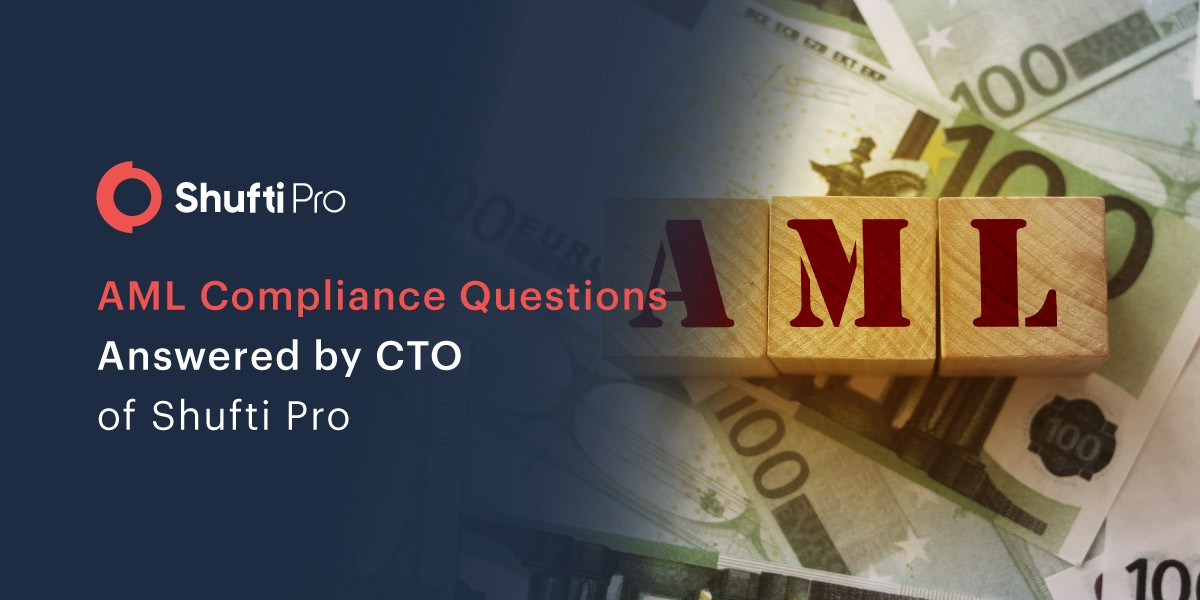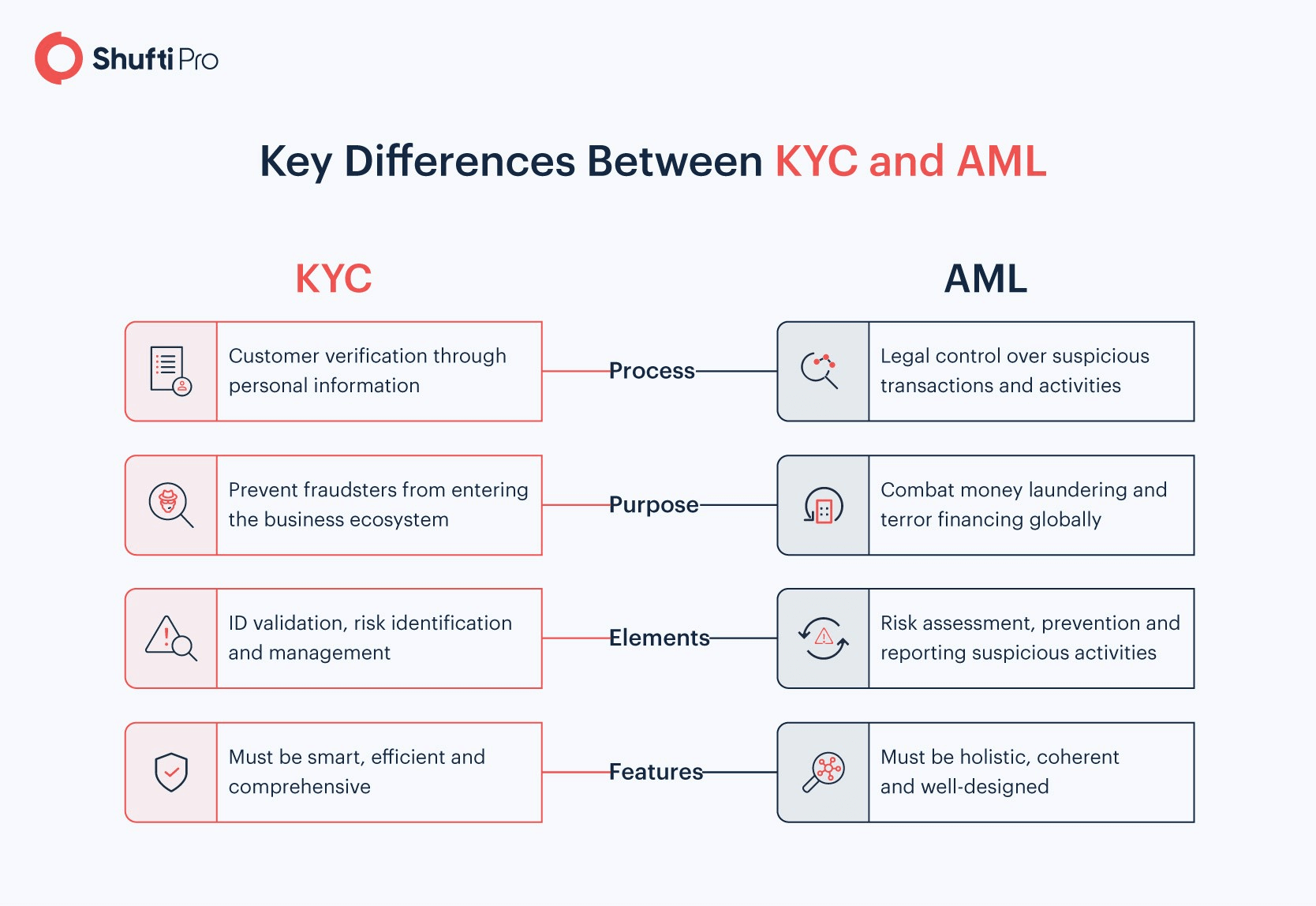Top 10 Questions about AML Compliance Answered by the CTO of Shufti

- 01 What is Money Laundering and How Does It Work?
- 02 What is the Difference Between KYC and AML?
- 03 What is a Beneficial Owner?
- 04 What is the Current Regulatory Landscape for AML?
- 05 How Can We Comply with the Laws?
- 06 Who Regulates these Laws?
- 07 What are the Benefits of AML Compliance for Companies?
- 08 How Does AML Compliance Benefit Customers?
- 09 What Happens if a Company Fails to Comply with these Laws?
- 10 Key Takeaways
The regulatory landscape is changing with time and a number of questions are arising. AML compliance is one of the biggest challenges for organisations, especially in the finance sector. Since the regulations have extended to many other sectors, the ambiguities have increased. Everybody needs all the answers to their questions about AML compliance like what is it, how does it work, who needs it, etc. After receiving several queries in this regard, the CTO of Shufti, Shahid Hanif, decided to answer them all. The blog has covered the top 10 questions about anti-money laundering compliance that will help you for sure. Without any long discussions, let’s quickly take a look at the FAQs about AML compliance.
What is Money Laundering and How Does It Work?
Money laundering is the act of concealing the origin of illegally earned money. Let’s say a financial criminal has earned money through drug smuggling, trafficking, etc. and wants to hide the black money from law enforcement bodies. For this, the criminal will devise a strategy and place it in a bank account, casino or even invest it somewhere. Money laundering works in the following three stages:
- Placement: This is the first stage where black money is segregated into small amounts and placed in a financial infrastructure like a bank.
- Layering: Now, black money is transacted multiple times through sales and purchases. For instance, the fraudster might convert some amount of money into bank drafts or invest in real estate as well.
- Integration: This is the final stage when illegal money is brought into the economy. Integration is done by fake loans, shell companies, bogus invoices, etc.
Find more details about these stages here: AML Screening – How it might infiltrate Your Business
What is AML Compliance?
AML compliance is a set of policies and procedures that allow businesses to detect financial crime like money laundering and terror financing. The identity of individuals is screened against several global watchlists including PEPs, sanctions, etc. Some regulatory bodies have made this an ongoing process for updating customer profiles regularly.
What is the Difference Between KYC and AML?
KYC or Know Your Customer refers to identity verification of customers, whereas AML or anti-money laundering refers to background checks of clients to combat potential money laundering and terror financing risks. Here are the key differences between both:

What is a Beneficial Owner?
Anyone who owns or controls the company is referred to as a beneficial owner by the Financial Action Task Force (FATF). Transactions and decisions can be made on behalf of these entities. Some people also call them UBOs or Ultimate Beneficial Owners. The FATF has defined two categories for UBOs:
- Those who have ownership of the company
- Those who have effective control
What is the Current Regulatory Landscape for AML?
The global regulatory landscape has remarkably evolved over time. Currently, FATF recommendations are leading every company across the world. As per FATF, all organisations have to adopt the risk-based approach (RBA). On the contrary, many countries have regulatory bodies that have imposed laws too.
- The European Union is currently following the sixth anti-money laundering directive (6AMLD)
- The UK has the Act of 2018 to follow post-Brexit
- Ukraine has the two-tier system for AML
- FinCEN has enforced the Bank Secrecy Act in the US
Suggested: The Changing Landscape of KYC/AML Regulations in 2021
How Can We Comply with the Laws?
To comply with global or regional laws, there are some key elements that you must consider first. Here the five key elements that can make an AML compliance program effective:
- Policies, procedures and controls that must be aligned with the regulatory requirements
- Employee training to identify suspicious activities on time
- Record maintenance for effective prospect prediction in the future
- Customer due diligence (CDD) protocols that include ID verification and background checks against not just domestic but global watchlists
- Reporting of any suspicious activities or transactions
Once you have all these elements in line, compliance with AML laws wouldn’t be a problem at all.

Who Regulates these Laws?
First, FATF has issued 40 recommendations that every state has to follow. These recommendations are the basis of all regional AML compliance programs. Here are some of the major regulatory bodies that have enforced AML laws in different parts of the world:
- FINTRAC – Regulates businesses in Canada with PCMLTFA
- AUSTRAC – Australian Transaction Reports and Analysis Centre or AUSTRAC is the AML/CFT law enforcing body of Australia
- FINMA – FINMA or Financial Market Supervisory Authority is the Swiss government agency responsible for monitoring financial activities
- FinCEN – Financial Crime Enforcement Network (FinCEN) enforces KYC/AML laws in the US
What are the Benefits of AML Compliance for Companies?
For companies, AML compliance brings in customer trust and ensures that all onboarded parties are legitimate. Be it end-users or intermediaries, Anti-Money Laundering compliance allows every company to avoid potential money laundering and terror financing risks. Moreover, it helps in identifying high-risk entities before they become a problem for the business.
How Does AML Compliance Benefit Customers?
For customers, it gets a lot easier to trust companies that comply with AML regulations. They can trust the company with the Personally Identifiable Information (PII). Furthermore, end-users know that they are safe from financial criminals.
What Happens if a Company Fails to Comply with these Laws?
In case a company fails to abide by the AML laws, hefty penalties will embrace them. The year 2020 had some record-breaking fines reported for AML non-compliance. A total of €12.09 billion was paid in fines by companies because they failed to fulfil the regulatory requirements. Apart from the hefty penalties, a damaged brand image is another big consequence of AML non-compliance.
Key Takeaways
To sum up, AML compliance programs have to be more rigid since regulations are continuously evolving. Anti-money laundering compliance programs have many minor details and resemble the KYC identity verification system a lot. It is likely that they spin your mind in no time, so we decided to ask our CTO to answer the top FAQs. After reading these answers, many of your ambiguities must have been resolved.
In case you have any more queries, please feel free to get in touch with our experts.

 Explore Now
Explore Now













